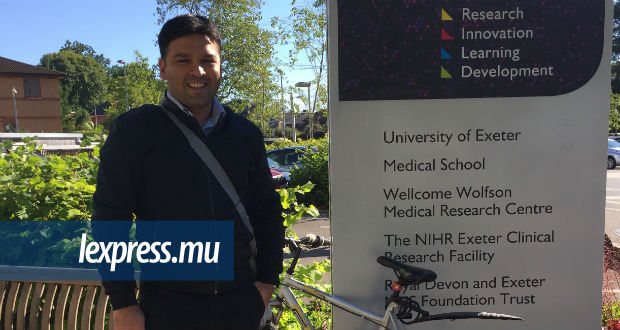Dr Neel Heerasing, a consultant gastroenterologist with special interests in Inflammatory Bowel Diseases and Clinical Nutrition, was born and raised in Mauritius. Having completed his medical training in Australia, he moved to the United Kingdom in 2016 to further his training and undertook a two-year research fellowship at the Royal Devon & Exeter NHS Foundation Trust and the prestigious Inflammatory Bowel Disease Pharmacogenetics Research Centre.
How was the transition from high school student in Mauritius to medical student in Australia?
I left Mauritius in February 2004 to embark upon a very exciting yet daunting adventure to Melbourne. It was a real eye-opener moving overseas and learning how to be independent. I was outside my comfort zone in an English-speaking country with a totally different culture and lifestyle. In Mauritius, I was always surrounded by a very supportive family and group of friends which enabled me to come through my A-levels. Although they remained in close contact from afar, I realised I needed to develop a new set of skills to do well at university as well as develop myself personally. There were no Mauritians in my medical class which consisted of about 200 students. I had to develop friendships which quickly blossomed and helped me throughout my medical degree.
You are a published scholar in the medical field. Tell us about your area of specialisation.
Medicine is a constantly evolving field and one needs to practise evidence-based medicine to provide the best quality care for their patients. I decided to sub-specialise in a branch of gastroenterology, namely inflammatory bowel diseases and I was lucky to obtain a fellowship in a highly reputable academic centre in the UK. Chronic inflammatory bowel diseases such as Crohn’s disease and Ulcerative Colitis are more prevalent in the developed countries although more cases are being diagnosed in the developing nations with the increase in western influence. My research centred around side effects experienced by patients during treatment and trying to identify a genetic basis for these adverse reactions. I also looked at the use of diet such as exclusive enteral nutrition as an adjunct in the treatment of patients with Crohn’s disease and our novel study was widely cited.
Speaking of research, this is often considered as a weakness among scholars in Mauritius. Do you think the lack of focus on research in Mauritius is a major drawback for us?
The high quality medical care that people in developed countries enjoy nowadays is testament to the extensive breadth of research carried out by scientists and medical professionals to advance the medical field. It is generally believed that nations with healthcare systems that invest in medical research provide a better quality of care to their citizens. A lack of research could lead to a stagnant healthcare system whereby evidence-based medicine is not commonly practised.
So that’s definitely something we should be allocating resources to in Mauritius?
Developing countries such as Mauritius need research to help relieve the economic burden of chronic diseases. For example, diabetes affects about 20% of the population in the island according to a survey done in 2015 by the Baker IDI Heart & Diabetes Institute. Diabetes is a major risk factor for cardiovascular diseases and stroke which significantly increase the burden of diseases in the country. National resources for research are often lacking in developing countries and it is therefore particularly important for each country to ensure that research is appropriate and relevant for its health needs. Public and private sectors in developed countries could potentially sponsor research to help bridge this gap. However, rigorous ethical safeguards must be in place to prevent the exploitation of those who take part in the research.


